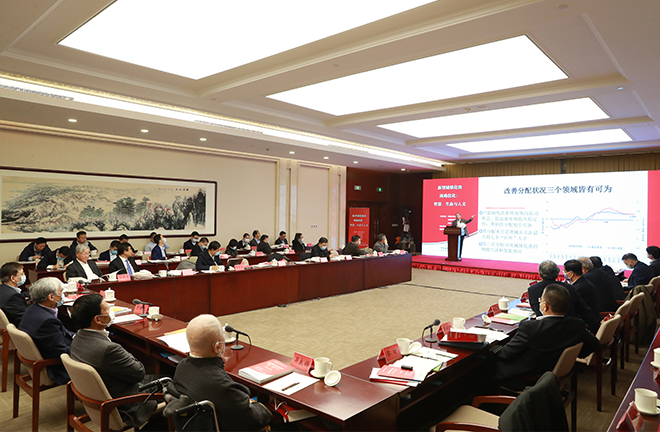Forum explores future of new-type urbanization

2021 annual conference of the 100 Forum on Urbanization in Beijing on Nov. 6 Photo: Zhu Gaolei/CSST
Under the theme “Strategic Optimization of New-Type Urbanization: Smart, Ecological, and Humanistic,” the 2021 annual conference of the 100 Forum on Urbanization was convened in Beijing on Nov. 6.
The participating scholars conducted discussions on population flow, urban planning, urban governance, industrial systems, and green development in the process of China’s new-type urbanization.
This year’s conference was jointly hosted by the Chinese Academy of Social Sciences (CASS), the Chinese Academy of Sciences (CAS), and the Chinese Academy of Engineering (CAE).
CASS President Xie Fuzhan pointed out that urbanization is the necessary path to modernization.
“It is necessary to deeply understand the law of urbanization development in our country, optimize the strategy for new-type urbanization, and promote the high-quality development of urbanization,” Xie said.
Xie highlighted three important issues in this process. One is the issue of sustainable development of areas with population outflow. The second is the coordinated development of large, medium-sized, and small cities. The third is the issue of healthier, safer, and more livable cities.
CAS President Hou Jianguo said that the rapid development of science and technology in the fields of life sciences, information technology, and artificial intelligence has not only greatly contributed to social progress, but also brought about such issues as scientific and technological ethics, and privacy security. In particular, the COVID-19 pandemic sweeping the world has made us more deeply aware that the process of urban development and progress is also a process of coping with unpredictable potential risks and challenges.
“This kind of serious challenge facing all mankind has become the touchstone of science and technology, allowing us to see both the power and the limitations of science and technology,” Hou said. The beauty of a city and the goodness of science and technology have become our common value pursuit.
Smart cities are the future direction of urban development and the trend of civilization development, said CAE President Li Xiaohong. It is vital to make full use of cutting-edge technologies, such as big data and cloud computing, to establish a visual and measurable city management and operation system on the basis of comprehensive digitization of the city, propelling the upgrading and innovation of urban governance. At the same time, it should be recognized that the core driving force for the transformation and upgrading of the urban development model lies in the technological innovation of the green economy.
In addition, Li noted that the humanistic city, humanistic governance, and humanistic care are the goals of urban development.
Cai Fang, chief expert of the CASS National High-End Think Tank, said that a new type of people-oriented urbanization can increase growth potential by increasing non-agricultural labor, and boost consumption demand by increasing the registered urban population, thereby helping maintain reasonable economic growth rates both on the supply side and the demand side. It can increase the proportion of labor remuneration and household disposable income in the total disposable income of the whole society, therefore adjusting the national economic distribution structure.
In addition, it can enhance residents’ income and wealth, and promote equitable access to basic public services through tertiary distribution, Cai continued. It also has the potential to promote vertical and horizontal social mobility and expand middle-income groups.
“It can be said that the new-type urbanization is a rewarding reform and an important way for high-quality development to promote common prosperity,” Cai concluded.
Edited by JIANG HONG

 PRINT
PRINT CLOSE
CLOSE